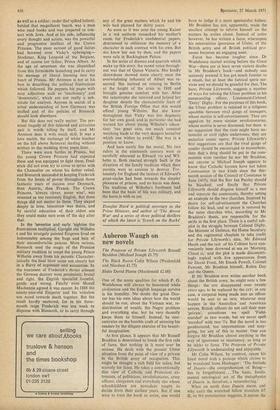Auberon Waugh on new novels
Slides David Plante (Macdonald £2.00) One of the many qualities for which P. G. Wodehouse will always be honoured while civilisation and the English language survive is his humility. No doubt the great Doc- tor has his own ideas about how the world should be run, about the Vietnam war, re- distribution of wealth, the Negro problem and everything else, but he very decently keeps them to himself. Instead, he con- centrates on the humble craft of amusing his readers by the diligent exercise of his beautii ful imagination.
At first glance, it appears that Mr Russell Braddon is determined to break the first rule of farce, that nothing in it must ever be serious. He deals with the present Ulster situation from the point of view of a private in the British army of occupation. This might be thought a rich field for satire, but scarcely for farce. He takes a conventionally dim view of Catholic and Protestant ex- tremists, of politicians, revolutionaries, army officers, clergymen and everybody else whom schoolchildren are nowadays taught to deride from their earliest years. But if one were to treat the book as satire, one would have to judge it a most spectacular failure. Mr Braddon has not, apparently, made the smallest attempt to inform himself on the matters he writes about. Instead of satire however, he has written a farce, whereupon his ostentatious ignorance of Ulster, of the British army and of British political pro- cesses becomes an engaging asset.
Farce has become tougher since Dr Wodehouse started writing before the Great War—there are at least seven violent deaths in Mr Braddon's book—and nobody can seriously pretend it has got much funnier as a result, but at least the farcical spirit sur- vives and we should be grateful for that, The hero, Private Lilyworth. suggests a number of ways for solving the Ulster problem to his commanding officer, Lieutenant-Colonel `Dotty' Digby. For the purposes of this book, the Ulster problem is reduced to a religious squabble between rival gangs of teenagers, whose motive is self-advertisement. They are egged-on by more sinister revolutionaries, whose motive is never discussed, but there is no suggestion that the riots might have na- tionalist or civil rights undertones; they are sectarian comic opera. Private Lilyworth's first suggestions are that the rival gangs of youths should be encouraged to masturbate; then that a drug should be put in the com- munion wine (neither he nor Mr Braddon, nor anyone at Michael Joseph appears to know that Catholic laymen have not taken Communion in two kinds since the thir- teenth session of the Council of Constance in June 1415); that the Rev Ian Paisley should be hijacked; and finally that Private Lilyworth should disguise himself as a nun and separate the contestants, thereby setting an example to the two churches. Inspired by desire for self-advertisement the Churches follow his lead, and so peace is restored by the same churches who, according to Mr Braddon's thesis, are responsible for the strife in the first place. There is a useful sub- plot in the struggle between Colonel Digby, the Minister of Defence. the Home Secretary and the regimental chaplain to take credit for Private Lilyworth's idea. Mr Edward Heath and the rest of his Cabinet have con- veniently been drowned at sea on 'Morning Cloud it,' and the plot is made disconcert- ingly topical with live appearances from Sir David Frost, Mr Enoch Powell, Colonel Fawcett, Mr Braddon himself, Robin Day and the Queen.
If Mr Braddon ever writes another book about the British army, he might note a few
things: the OTC disappeared over twenty years ago, to be replaced by the CCF: in any case, a corporal being made into an officer would be sent to an ocs; whatever may happen in the Australian and American armies, British officers do not call their men
'private', sometimes we spell `Field- marshal' as two words, but we never spell 'marshal' with two Ts. But the novel is too goodnatured, too unpretentious and easy- going, for any of this to matter. One can forgive Mr Braddon almost anything in the way of ignorance or inaccuracy, so long as he sticks to farce. The Progress of Private Lilyworth is undemanding and enjoyable.
Mr Colin Wilson, by contrast, opens his latest novel with a passage which claims to be translated from Heidegger: 'The finitude of Dasein—the comprehension of Being— lies in forgetfulness ... The basic, funda- mental ontological act of the metaphysics of Dasein is, therefore, a remembering.'
What on earth does Dasein mean, and why can't the wretched fellow translate it? If, as the punctuation suggests, it means the
comprehension of Being, then the quotation is meaningless. Human comprehension is finite because humanity is finite. Forget- fulness has nothing to do with it. Nor, I am happy to say, has this silly remark got anything to do with Mr Wilson's new novel, which is an extremely jolly thriller about any independent spy network making fools of the KGB, the CIA, mi5 and almost any other com- bination of letters and numerals one cares to devise, It has everything one could reasonably expect of a spy thriller: a character called Klumpfuss (obligingly translated as Clubfoot) with a hook in place of a hand; another character (is he MI5, CIA, KGB, cau, lc or merely another bloody Swede?) called Gunnar Varborg, whose hand is like a claw; there is an MIS agent who likes to whip prostitutes in Soho; and a hero, called Kit Butler, who has intercourse With three girls in as many chapters, who is forever being lightly slapped on the shoulder' by other male characters and who changes sides at least once. Finally, it re- veals what one always suspected, that Beria genuinely was a Nazi agent, and the Russians were quite right to execute him or this, rather than for the murder of seven million of his countrymen.
Mr Wilson may be a moral and ideological imbecile, but he writes pleasantly enough and his thriller observes most of the con- ventions. if it becomes a trifle in- comprehensible towards the end, this should be seen more as the intoxication of someone Who has glimpsed the money-spinning secret of John le Carre than as the obscurantism of a pseudo-intellectual. The author's imagina- tion may soar beyond any finitude or pro- bability, but so, after all, did the imagination of Sapper, Peter Cheyney, Ian Fleming and even the writer whom Mr Wilson, in his maturity, most closely resembles, Henry Rider Haggard. Those who would criti- cise Mr Wilson foi the exuberance of his Imagination should reflect on what would Probably happen to their own imaginations If they had lived in a Cornish cottage on fif- teen pounds a week. The Black Room is a thoroughly enjoyable book.
wish I could say the same about David Plante's Slides. Much hard work has gone Into it. The author is inspired by a serious Purpose. It is a worthy book. The dustcover suggests that it explores the mind of the American novelist Nathaniel Hawthorne With particular reference to his novel, The Marble Faun. Perhaps it does. I read The Marble Faun (or Transformation) about fifteen years ago, found it horribly boring and have since forgotten it almost com- Pletely. Was there not a bogus character called Donatello, or Botticelli, or Charles Morgan, or something like that, who murdered his rival in love and was then striken by remorse? Slides is about three Chaps Called Bob, Jim and Ralph, wth two girls called Claire and Julie. If I say that 4 found it, as a novel, coy, trite, illiterate and boring, I hope nobody will suppose that I ex- pect them to agree with me. It is plainly a thoroughly good, thoroughly worthy novel, and we must not suppose that all the reviewers who have been creaming their leans over it for the last few weeks are boobies. Perhaps they are, but this is not the occasion to say so. When Mr Plante has learned something of the essential frivolity of the human condition, I shall look forward to reading his novels. One can agree with the Times that he is plainly a writer to watch, even if one cannot actually recommend anyone to read him at this stage.











































 Previous page
Previous page